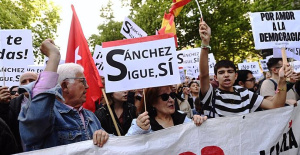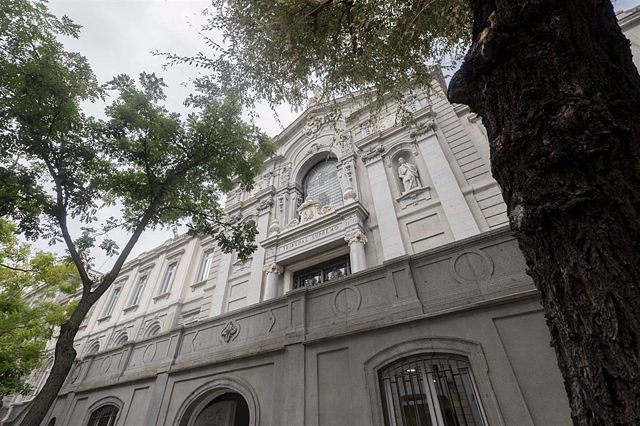Instructs the Catalan court to decide whether it is appropriate to assume the facts attributed to Vila, who is also a former counselor
MADRID, 4 Ene. (EUROPA PRESS) -
The Supreme Court has declared the competence of the Superior Court of Justice of Catalonia (TSJC) to hear the case against the former Catalan Minister of Culture Lluis Puig -one of the fugitives from the 'procés'-- for the crime of disobedience to the judicial authority in relation to the transfer order of certain works of art from the National Art Museum of Catalonia to the Monastery of Sijena in Huesca.
In an order dated December 20, collected by Europa Press, the Criminal Chamber of the high court resolves the matter of jurisdiction after receiving a reasoned statement from the Criminal Court Number 1 of Huesca last October and establishes that it must Being the TSJC itself the one that decides if it agrees to his prosecution and that of the also former Catalan Minister of Culture Santi Vila.
The facts have their origin in the sentence handed down on April 8, 2015 by the Court of First Instance 1 of Huesca, which decreed the full nullity of the sales carried out by the Generalitat between 1983 and 1992 and by the National Museum of Art. of Catalonia in 1994, declaring that the ownership of the goods corresponded to the Order of San Juan of the Royal Monastery of Sijena.
In 2019, the Court of Huesca issued an order to open an oral trial against Puig and Vila in this case, arguing that he had lost jurisdiction due to the acquisition by the former of the status of deputy of the Parliament of Catalonia in March 2021.
The Huesca court considered that the jurisdiction should go to the Supreme Court, since it was an autonomous deputy accused of a crime committed outside of Catalonia. In this sense, he defended that disobedience should be understood as committed in the place from which the omitted court order came, that is, in Huesca.
For its part, the Prosecutor's Office supported that the competence belonged to the Supreme Court, since the crime was not committed in Catalonia, although it did not agree that the place of the crime was the one in which the inattentive judicial order was issued, but rather the place where the defendant should have deployed the conduct omitted, in this case, the town of Villanueva de Sijena (Huesca), because it was there where the 44 pieces that were the object of the judicial requirements had to be transferred.
In any case, the Public Ministry assured that, since the conduct would have been committed outside of Catalonia, the jurisdiction for being registered would also fall to the Supreme Court.
However, the high court dismissed both arguments and recalled that the crime of disobedience must be understood as committed in the place where the subject omitted the conduct concerned by the order that he decided to disregard. In this case, the Chamber considers that the conduct omitted by Puig in his capacity as a member of the Catalan autonomous government, "would have occurred in the territory of Catalonia."
"In which he himself carried out his relevant functions regardless of whether, undoubtedly, the final destination of the goods that he had to send, as he would have been ordered, was another (in this case, Villanueva de Sijena)," the order states.
The court adds that the former counselor, "for full compliance with the order received, should have given, in turn, according to the accusations, the necessary instructions for said transfer to be fully carried out." "And it is there, in the place where he performed his duties, where he would have stopped executing the conduct that was imposed on him by the judicial order," he argues.
The Supreme Court concludes that the competence, as it is a regional deputy and the acts have been committed in Catalonia, belongs to the Catalan Superior Court of Justice, which is also entrusted with deciding whether, for reasons of connection, it is appropriate or not for it to take cognizance of the facts that are attributed to the other defendant in the same case, the also former Catalan Minister of Culture Santiago Vila.
The alleged crime of disobedience attributed to them, recalls the Supreme Court, refers to the fact that the defendants would not have responded to, or even obstructed, the decision of the Court of First Instance and Instruction Number 1 of Huesca by which they were ordered, in their capacity as members of the Catalan regional government, transfer certain works of art from the National Museum of Art of Catalonia to the Monastery of Sijena.

 Exploring Cardano: Inner Workings and Advantages of this Cryptocurrency
Exploring Cardano: Inner Workings and Advantages of this Cryptocurrency Seville.- Economy.- Innova.- STSA inaugurates its new painting and sealing hangar in San Pablo, for 18 million
Seville.- Economy.- Innova.- STSA inaugurates its new painting and sealing hangar in San Pablo, for 18 million Innova.- More than 300 volunteers join the Andalucía Compromiso Digital network in one month to facilitate access to ICT
Innova.- More than 300 volunteers join the Andalucía Compromiso Digital network in one month to facilitate access to ICT Innova.-AMP.- Ayesa acquires 51% of Sadiel, which will create new technological engineering products and expand markets
Innova.-AMP.- Ayesa acquires 51% of Sadiel, which will create new technological engineering products and expand markets Abascal (Vox) criticizes that Sánchez is "victimizing" himself and calls for elections after his possible resignation
Abascal (Vox) criticizes that Sánchez is "victimizing" himself and calls for elections after his possible resignation Carlos Alcaraz reaches the round of 16 in Madrid without breaking a sweat
Carlos Alcaraz reaches the round of 16 in Madrid without breaking a sweat Some 5,000 people demonstrate in front of Congress for democracy, hours before Sánchez's decision
Some 5,000 people demonstrate in front of Congress for democracy, hours before Sánchez's decision STATEMENT: Intelligent systems used in the construction of the deepest underwater tunnel in China
STATEMENT: Intelligent systems used in the construction of the deepest underwater tunnel in China How Blockchain in being used to shape the future
How Blockchain in being used to shape the future Not just BTC and ETH: Here Are Some More Interesting Coins Worth Focusing on
Not just BTC and ETH: Here Are Some More Interesting Coins Worth Focusing on UPV students build a prototype of a wooden house to move to Equatorial Guinea
UPV students build a prototype of a wooden house to move to Equatorial Guinea The UA opens the call for the Impulso 2024 Awards for the best innovative business initiatives
The UA opens the call for the Impulso 2024 Awards for the best innovative business initiatives ALI, virtual assistant from Alicante, internationally recognized by the OECD
ALI, virtual assistant from Alicante, internationally recognized by the OECD Retrópolis brings the golden age of video games and computing to the UPV
Retrópolis brings the golden age of video games and computing to the UPV A million people demonstrate in France against Macron's pension reform
A million people demonstrate in France against Macron's pension reform Russia launches several missiles against "critical infrastructure" in the city of Zaporizhia
Russia launches several missiles against "critical infrastructure" in the city of Zaporizhia A "procession" remembers the dead of the Calabria shipwreck as bodies continue to wash up on the shore
A "procession" remembers the dead of the Calabria shipwreck as bodies continue to wash up on the shore Prison sentences handed down for three prominent Hong Kong pro-democracy activists
Prison sentences handed down for three prominent Hong Kong pro-democracy activists ETH continues to leave trading platforms, Ethereum balance on exchanges lowest in 3 years
ETH continues to leave trading platforms, Ethereum balance on exchanges lowest in 3 years Investors invest $450 million in Consensys, Ethereum incubator now valued at $7 billion
Investors invest $450 million in Consensys, Ethereum incubator now valued at $7 billion Alchemy Integrates Ethereum L2 Product Starknet to Enhance Web3 Scalability at a Price 100x Lower Than L1 Fees
Alchemy Integrates Ethereum L2 Product Starknet to Enhance Web3 Scalability at a Price 100x Lower Than L1 Fees Mining Report: Bitcoin's Electricity Consumption Declines by 25% in Q1 2022
Mining Report: Bitcoin's Electricity Consumption Declines by 25% in Q1 2022 Oil-to-Bitcoin Mining Firm Crusoe Energy Systems Raised $505 Million
Oil-to-Bitcoin Mining Firm Crusoe Energy Systems Raised $505 Million Microbt reveals the latest Bitcoin mining rigs -- Machines produce up to 126 TH/s with custom 5nm chip design
Microbt reveals the latest Bitcoin mining rigs -- Machines produce up to 126 TH/s with custom 5nm chip design Bitcoin's Mining Difficulty Hits a Lifetime High, With More Than 90% of BTC Supply Issued
Bitcoin's Mining Difficulty Hits a Lifetime High, With More Than 90% of BTC Supply Issued The Biggest Movers are Near, EOS, and RUNE during Friday's Selloff
The Biggest Movers are Near, EOS, and RUNE during Friday's Selloff Global Markets Spooked by a Hawkish Fed and Covid, Stocks and Crypto Gain After Musk Buys Twitter
Global Markets Spooked by a Hawkish Fed and Covid, Stocks and Crypto Gain After Musk Buys Twitter Bitso to offset carbon emissions from the Trading Platform's ERC20, ETH, and BTC Transactions
Bitso to offset carbon emissions from the Trading Platform's ERC20, ETH, and BTC Transactions Draftkings Announces 2022 College Hoops NFT Selection for March Madness
Draftkings Announces 2022 College Hoops NFT Selection for March Madness























